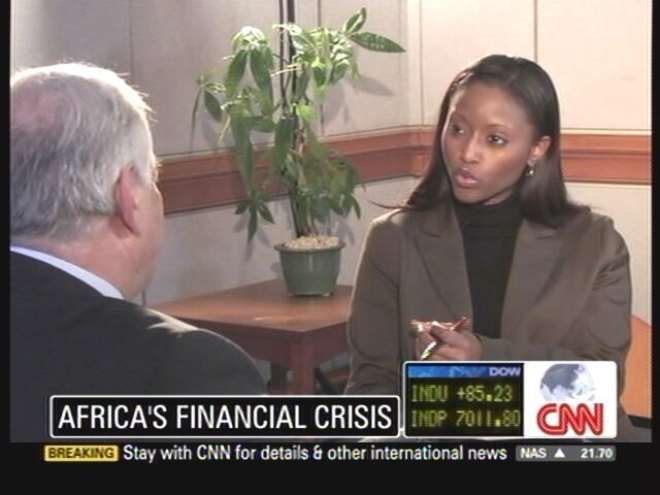
DOMINIQUE STRAUSS-KAHN, DIRECTOR, INTERNATIONAL MONETARY FUND: Well, you're right in saying it's the worst time. It's the worst time for two reasons. The first one is the one you mentioned. It is that the last decade has been rather good for many African countries, with the beginning of development, high growth. And the problem now is to maintain what they had won during the last decade, and it's not that easy. But there's also another reason, which is that the financial crisis, which is now hitting hard these countries, came on top of the food crisis. And even if the food crises are not increasing anymore, they are at the level which is significantly higher than two years ago.
So, the cost of living for most of those countries and for the people there is still very high.
So, you have both crises. The crisis of the rest of the – the follow-up of the food crisis and the financial crisis and the slowdown in global growth.
ISHA SESAY, CNN INTERNATIONAL CORRESPONDENT: Give me an example. Give me an African economic success story, and tell me how they are feeling it.
STRAUSS-KAHN: I can think many of them. Look at Zambia, for instance.
Zambia is a country which did a lot during the last decade, creating fiscal space, balancing the budget, really following not only IMF advice, but also from the World Bank and other (INAUDIBLE). They did well. Now, as you know, that the Zambian economy is very much reliant on copper, and the export of copper just collapsed. So, they had to close one of the mine, lay off in other mines, and of course there are a lot of social (INAUDIBLE) in the population. So, even a country having really good policy in place, having natural resources, just at the verge of succeeding, they are now in a bad situation. And there are many other examples.
So, the situation now for us today is to have African countries to retain some of the gains, hard-won gains from the last decade.
SESAY: Do you feel they'll be reversed?
STRAUSS-KAHN: No, I don't think so. Well, it depends. It's a case-by-case situation. You can't just speak about all the countries at the same time. For some countries, this can be the case. For most countries, I don't believe this. And I think we can still go on with them, helping them to develop. But that's the reason for this conference in Tanzania, trying to take stock of what has been done during the last decade, sometimes our mistakes, sometimes the mistakes of the country, sometimes the right thing which has been done, and drawing the lessons from this period and trying to see how we can use this looking forward.
And not only for public policies, but also how to associate the private sector to this development. And I'm really confident that there's a lot of opportunities in Africa for the private sector.
SESAY: The head of the World Bank, Robert Zoellick, said that – he put forth this proposition, that each developed country pledge 0.7 of its stimulus package to a vulnerability fund to help developing countries weather the storm. What do you think about that?
STRAUSS-KAHN: Great idea. I don't know if it will fly because, you know, advanced economy has their own problems, and that what I told you before about aid. But we have to press for this, I mean, really try to obtain that part of the stimulus will be used for low-income countries.
SESAY: I know that the IMF is giving a great deal of help to Eastern Europe. I'm wondering what kind of level of assistance African countries are reaching out to you for at this point in time.
STRAUSS-KAHN: Well, that's a really amazing problem. All the magnitude of the sums which are needed in Eastern Europe are hundreds of times what we need in Africa. And it's kind of a scandal that we're likely to fund millions (ph) of dollars for – I don't want to bash any way the European countries, but emerging countries all around the world exist on – especially Eastern Europe – billions of dollars. And we hardly fund millions of dollars for African countries. So, that's really a problem we want to face here in the IMF.
SESAY: So, there is a sense that it's each country for themselves in devising their own way to get out of this crisis, that there is no coordinated plan, global coordinated plan. I'm wondering what the IMF is doing to fix that, because ultimately, everyone does need to work together.
STRAUSS-KAHN: No, it's (INAUDIBLE). It's not as coordinated as should be, absolutely right. And we are asking and asking and asking again for more coordination, because the effectiveness of what is done by government is multiplied by two, three or four…
SESAY: Absolutely.
STRAUSS-KAHN: … when they work together. On the other – so, it's (INAUDIBLE), that's right. On the other hand, it's a bit too much to say that there's no coordination at all. And look at the fiscal stimulus, for instance. It takes place in most countries where it's possible. In some countries, it's not possible because they have too much debt.
SESAY: Germany has been resistant up until now.
STRAUSS-KAHN: Yes, exactly. That's a good example. It's a good example of what we see. It has been resistance, showing that coordination is – exactly. But finally, they do it, which shows that coordination is not that bad. So, it takes time, but at the end of the day, everybody does what he has to do.






 Burkina Faso expels French diplomats for 'subversive activities'
Burkina Faso expels French diplomats for 'subversive activities'
 GOIL reduces petrol price by 29 pesewas, sells GHC14.70 per litre
GOIL reduces petrol price by 29 pesewas, sells GHC14.70 per litre
 The disrespect towards security is terrible; we can do better — Atik Mohammed co...
The disrespect towards security is terrible; we can do better — Atik Mohammed co...
 Starlink to cease connection in Ghana, other “unavailable” countries on April 30...
Starlink to cease connection in Ghana, other “unavailable” countries on April 30...
 MMCEs, DCEs and Regional Ministers must be elected to reduce political interfere...
MMCEs, DCEs and Regional Ministers must be elected to reduce political interfere...
 National Cathedral: ‘Nonsense; you take taxes from broke Ghanaians to dig a clum...
National Cathedral: ‘Nonsense; you take taxes from broke Ghanaians to dig a clum...
 April 18: Cedi sells at GHS13.59 to $1, GHS13.01 on BoG interbank
April 18: Cedi sells at GHS13.59 to $1, GHS13.01 on BoG interbank
 We must harness the collective power and ingenuity of female leaders to propel o...
We must harness the collective power and ingenuity of female leaders to propel o...
 Saglemi Housing Project will not be left to rot – Kojo Oppong Nkrumah
Saglemi Housing Project will not be left to rot – Kojo Oppong Nkrumah
 Asantehene commends Matthew Opoku Prempeh for conceiving GENSER Kumasi Pipeline ...
Asantehene commends Matthew Opoku Prempeh for conceiving GENSER Kumasi Pipeline ...
